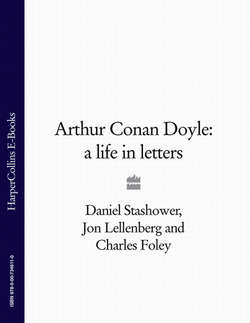Читать книгу Arthur Conan Doyle: A Life in Letters - Daniel Stashower, Исмаил Шихлы - Страница 130
to Mary Doyle LISMORE, JULY 1881
ОглавлениеI suppose dear old Tottie is with you by this time, and that Lottie is knocking around. I am beginning to get in the fidgets to come over to them. As you supposed my silence was due to the copying of my yarn. 40 foolscap pages, closely written it covered. You are right about the ‘murders’. I decided on calling it ‘The Gully of Bluemansdyke’ a true Colonial story. I sent it in yesterday with an appropriate letter to the editor. I think it very good but he may think otherwise. It has more individuality of style about it than any of my former lucubrations.
I am jogging along here very happily. I don’t like Mary at all. She is very selfish, cold & generally objectionable. Miss A is a puddingheaded idiot in spite of her bursaries &c. She is the greatest fool in petticoats that ever I met, so help me Bob! The old lady is a darling but rather inclined to yield to Mary’s absurd whims & tempers. Letts is an angel I’d marry her as soon as look at her if I was older or she was younger. I am thinking of performing the same cheerful ceremony with a splendid creature. By Jove! Such a beauty! Miss Elmore Weldon. We have been flirting hard for a week so that things are about ripe. There are two or three other girls about who I am longing to marry also, so that I am in a pitiable condition—perfectly demoralized. There’s a Miss Jeffers from Kilkenny, a little darling with an eye like a gimlet who has stirred up my soul to its lowest depths. I am to meet her & Elmore today and they are to show me the beauties of the ‘New Walk’.
The holiday’s end forced him to think hard about his future again. He visited George Budd in Bristol in September, and turned their ‘joyous riotous’ time into a hilarious short story, ‘Crabbe’s Practice’. But he found Budd’s practice there on the rocks, and suddenly a medical life at sea looked more realistic.
That idea was scuppered by a second cruise as a ship’s surgeon, from October 1881 to January 1882, this time on the steamship Mayumba, carrying cargo and passengers to and from Madeira and West Africa.
It was another big adventure, and also gave him welcome time to read, recording in a diary impressions of Carlyle (‘a grand rugged intellect [but] I fancy Poetry, Art and all the little amenities of life were dead letters to him’) and Oliver Wendell Holmes (‘a man after my own heart. He talks about Pathological Piety and Tuberculous Virtues—rather good’).
But he later called it the four most miserable months of his life. The heat sapped his energy for writing (‘Oh for a pair of skates and a long stretch of ice’). And at Lagos, in present-day Nigeria, a tropical fever brought ‘nightmare fog from which I emerged as weak as a child.…I had barely sat up before I heard that another victim who got it at the same time was dead.’
It’s no joke when the doctor of one of these isolated gunboats himself falls ill. You might think it easy for him to prescribe for himself but this fever knocks you down like a club, and you haven’t strength left to brush a mosquito off your face. I had a touch of it at Lagos, and I know what I am telling you.
—‘A Medical Document’
In the dim light of a foggy November day the sick room was a gloomy spot, but it was that gaunt, wasted face staring at me from the bed which sent a chill to my heart. His eyes had the brightness of fever, there was a hectic flush upon either cheek, and dark crusts clung to his lips; the thin hands upon the coverlet twitched incessantly, his voice was croaking and spasmodic. He lay listlessly as I entered the room, but the sight of me brought a gleam of recognition to his eyes. ‘Well, Watson, we seem to have fallen upon evil days, ‘said he in a feeble voice, but with something of his old carelessness of manner.
—‘The Adventure of the Dying Detective’
He liked little that he saw in West Africa, and returned home convinced that it was better to be a poor man in England than a rich one there. His letters home went not only to his mother, but also to Amy Hoare and yet another ‘second mother’ of his, Mrs Charlotte Drummond of Edinburgh, with whose daughter Jessie, slightly older than him, and son Tom, slightly younger, he had grown up.
